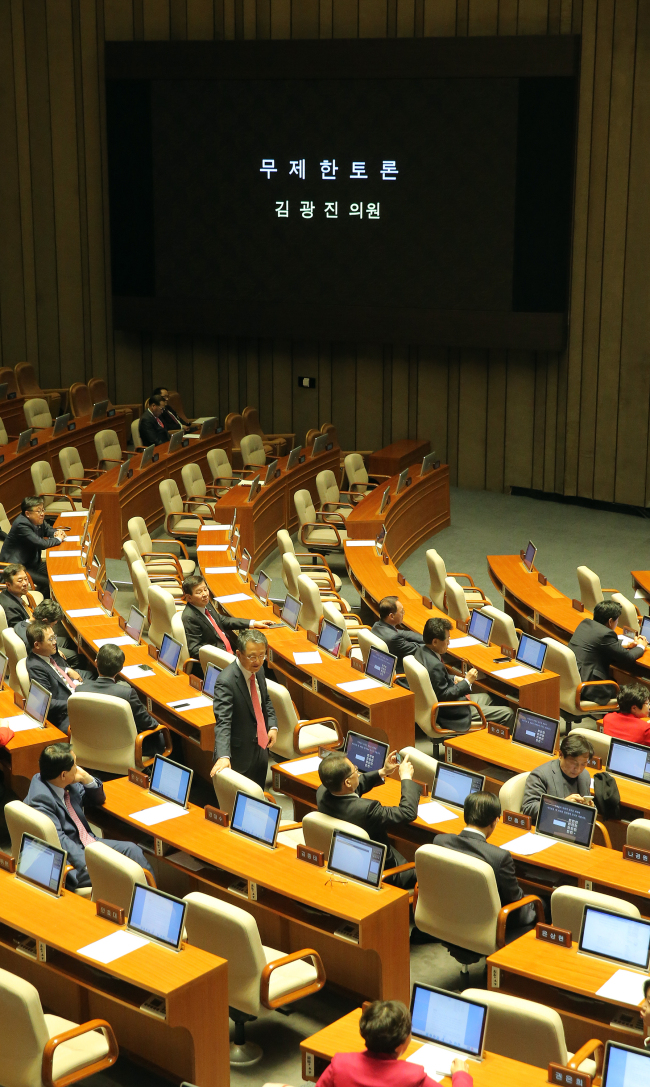The National Assembly speaker’s decision Tuesday to put an antiterrorism bill to a vote was seen as a show of support for the law, which the opposition has branded as unnecessary and politically motivated.
Ruling party lawmakers moved quickly upon the announcement by Assembly Speaker Chung Ui-hwa that he would exercise his authority to bring the government-led security bill to a vote in a plenary session without sending them to a legislative committee. The Saenuri Party members of the Intelligence Committee approved the bill to be handed over to the plenary session without the attendance of opposition members.
Earlier in the day, Chung told reporters that he deemed the failure to pass the bills as a “national crisis,” a situation in which the law allows the speaker to bypass parliamentary committee approval and bring the bills to the floor.
The move heightened tension at the Assembly which had been embroiled in a months-long dispute over whether the security legislation would help the government prevent terrorism threat without undermining civil rights.
 |
| Opposition lawmakers gather to listen to the Minjoo Party of Korea Rep. Kim Kwang-jin’s filibuster against a counter-terrorism bill. Yonhap |
The counter-terrorism bill, authorized by Rep. Lee Cheol-woo of the Saenuri Party and among others, includes provisions that would overhaul the government’s approach to combating conventional and cyber terrorist threats by granting the intelligence agency greater surveillance power.
According to Article 9 of the Counter-terrorism Act for Public and People’s Safety, the National Intelligence Service can collect financial transaction and telecommunications records of terrorism suspects.
The Park Geun-hye administration and the Saenuri Party assert that the surveillance power is necessary to reinforce the government’s capability to fend off terrorist threats such as those from North Korea and the Islamic State militant group.
They also argue that the law includes measures to prevent the NIS from abusing its power, such as the Article 5, 6 and 7, which stipulate that the counter-terrorism efforts are led by the Prime Minister’s office, not the NIS.
But The Minjoo Party of Korea questions whether the new bill would be crucial to counter-terrorism efforts. “I don’t agree with the government and Saenuri Party’s argument that the lack of legislation has undermined counter-terrorism efforts,” said Rep. Lee Jong-kul, the party’s floor leader.
Citing the laws governing the NIS duties and other security laws, he noted that the current legal system grants the government enough authority to engage in counter-terrorism efforts. Article 3 of the NIS Act stipulates that the intelligence agency can collect information about terrorism.
The Minjoo Party also argues that the NIS is an unreliable agency. The NIS has faced allegations that it deliberately interfered in the 2012 presidential election to swing the voters in favor of then president candidate Park Geun-hye. It also found itself embroiled in a surveillance scandal that led a NIS official to take his own life in 2015.
“The best option for us is that the government should establish an independent organization that does not have the infamous reputation that the NIS has,” said professor Lee Man-jong of Howon University, who has studied terrorism and security.
“The previous laws are designed to focus on reactive measures following terrorist attacks. What the current law aims to do is to focus on proactive measures that allow us to prevent attacks before they happen,” Lee said.
By Yeo Jun-suk (jasonyeo@heraldcorp.com)

